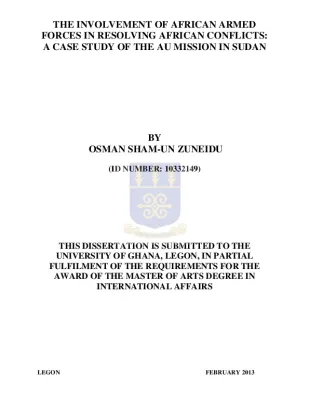"Conflicts in human settlements on the globe are inevitable due to cultural and ethnic matters, identity and individual differences, social settings, political/power struggles and struggle over scarce natural resources. The African continent since end of the Cold War up to date has witnessed a number of wars and conflicts with current and most devastating one being the conflict in Darfur - Sudan. The involvement of African Armed Forces alongside the UN and other agencies has become necessary in fostering peace and security in most countries in Africa, especially in Darfur, Sudan. This paper focuses mainly on analysing the conflict situations in Africa and the involvement of African Armed Forces to solve these problems, using the AU Mission in Sudan as a Case Study. The qualitative research methodology is employed to analyse the conflicts in Sudan, the African Union intervention and the successes and challenges encountered in the mission. It was found that the country‟s historical background explained the root causes of continuous conflicts in the region. However, the struggle over oil sharing, border demarcation, and national currencies are among the current reasons for the conflict. The AU‟s record in conflict resolution using African Armed Forces on the African Continent and in Sudan in particular, has been a mixed bag of successes and challenges. The normative shift from „non-interference‟ to „non-indifference‟ in itself is a basic success story in the history of conflict resolution in Africa. In Sudan in particular, the intervention has helped to contain the conflict to some extent. It has also prevented violence against women, reduced the recruitment of children into armed forces, assisted with displaced persons and protected humanitarian corridors and convoys. However, the mission was also challenged by the lack of resources, ill-defined mission and mandate, and lack of clear plan for achieving peace. This thesis is of the view that the AU should ensure that peace operations are adequately resourced and armed with clear operational directives and clear mandates to carry out missions successfully to ensure stability and security for the African continent. Further, AU should also ensure that it upholds the provision of the Constitutive Act which affirms the right of the Union to intervene in a Member State with respect to crisis situations or grave circumstances, namely war crimes, genocide and crimes against humanity. "
Publisher(s)
Publication year
2013
Abstract
ACCESS
File
Document
RS601_.pdf
(2.28 MB)
Access
“Open” means that the resource is available to view, but please check the weblink for restrictions on use. “Restricted” means that the resource is not openly accessible to all, but you can purchase a copy, or your organisation might have an institutional subscription.
FURTHER INFORMATION
Keywords
Organisation(s)
Country
Language(s)
